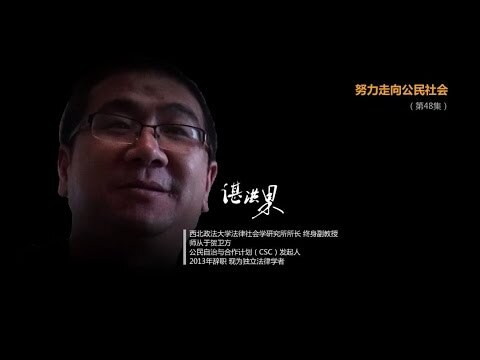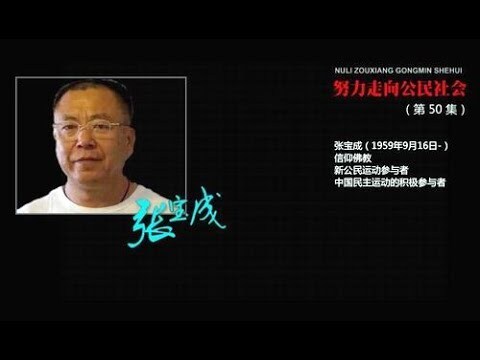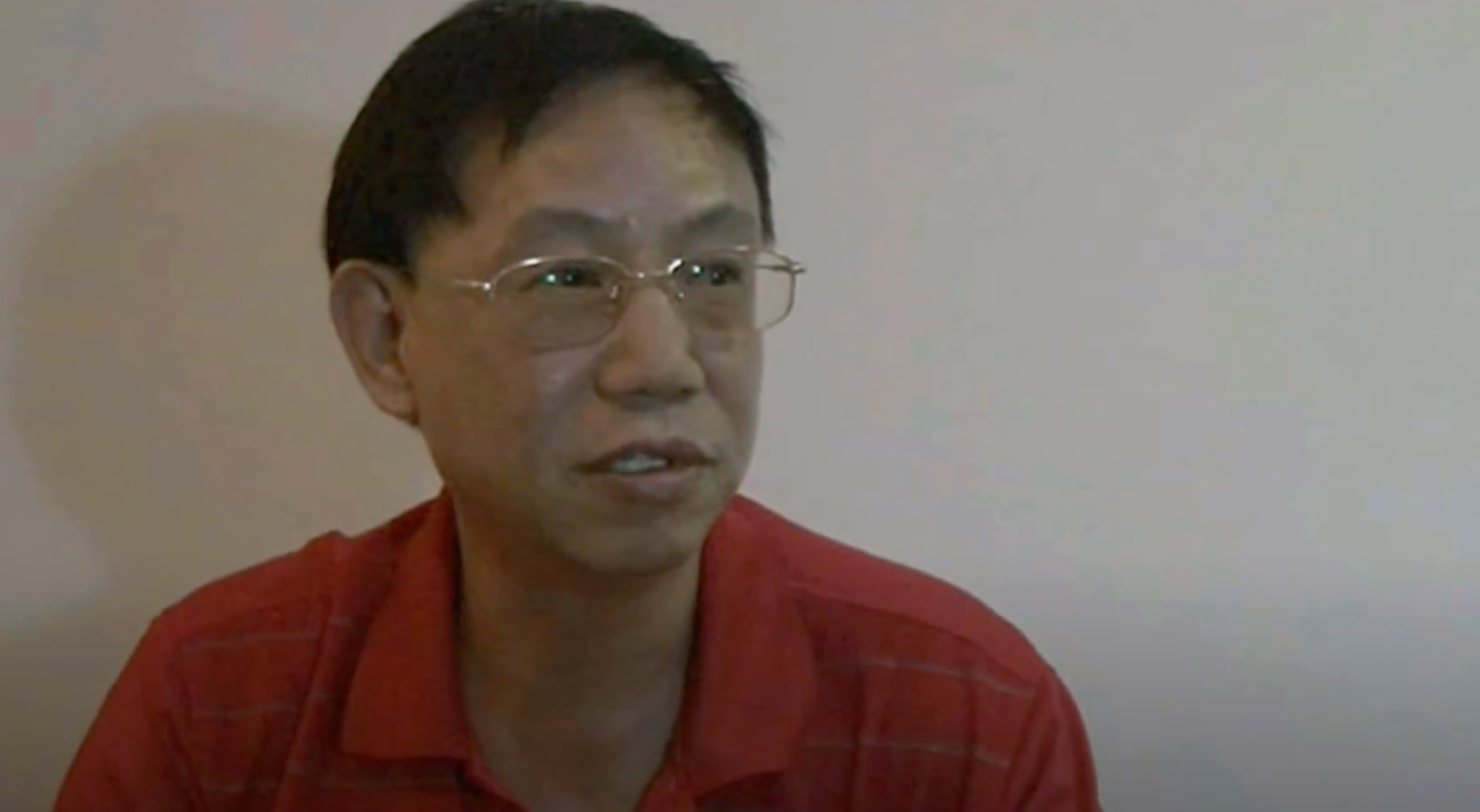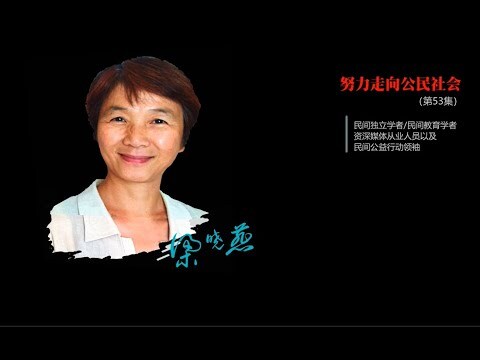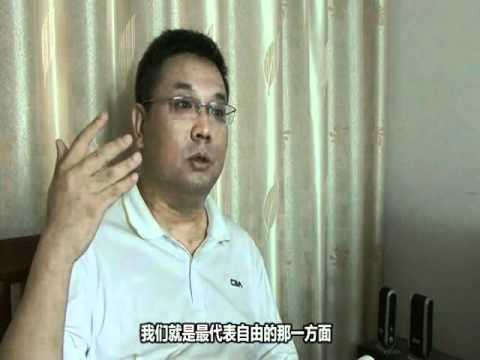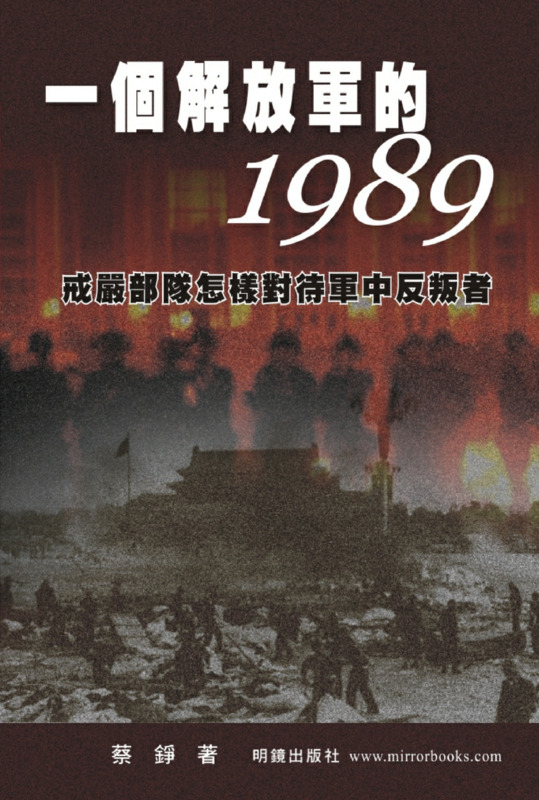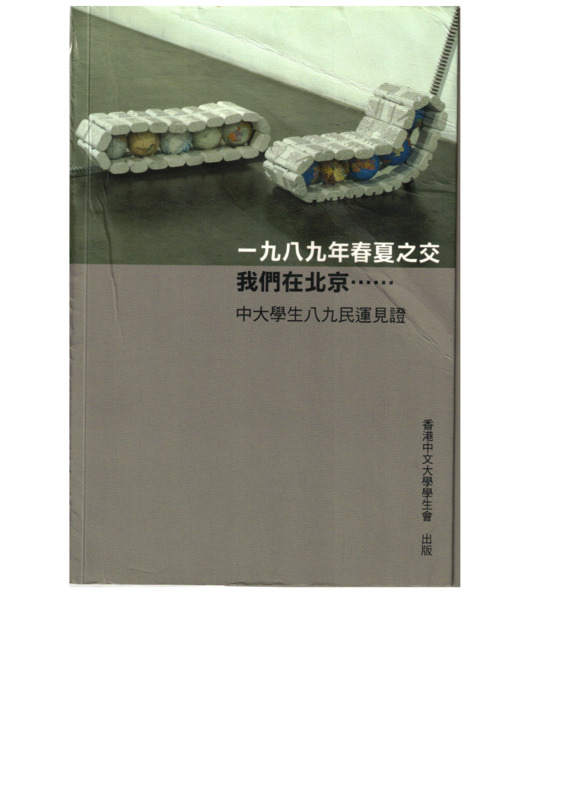Explore the collection
Showing 167 items in the collection
167 items
Film and Video
Working toward a Civil Society (Episode 48): Chen Hongguo
How can China build a true civil society? Since 2010, independent director Tiger Temple has conducted a series of interviews with scholars and civil society participants.
Film and Video
Working toward a Civil Society (Episode 49): Ding Jiaxi
ow can China build a true civil society? Since 2010, independent director Tiger Temple has conducted a series of interviews with scholars and civil society participants.
Film and Video
Working toward a Civil Society (Episode 5): Cui Weiping
The Xi’an-based videographer Zhang Shihe, or Tiger Temple, has been a fixture on the independent Chinese history scene for more than twenty years. In 2010, he began a thirty-part series of short interviews with leading Chinese thinkers called “Working Toward Civil Society,” in which he explores how China can build a true civil society. Some of those interviewed have now been silenced, passed away, or moved abroad, making the series itself a work of history.
In this episode, Zhang interviews one of China’s most thoughtful public thinkers, Cui Weiping. Cui is a professor at the Beijing Film Academy, and translator of Havel into Chinese. She was a signer of Charter 08, and friend of the late Nobel Peace Prize laureate Liu Xiaobo. Although the interview is only 8 minutes long, Cui touches on some of the key problems that continue to plague China: how to break free of overwhelming government control of civic life?
Note to English speakers: this interview only has Chinese subtitles. The CUA is working to add English subtitles to all of our video offerings so check back in a few months.
Film and Video
Working toward a Civil Society (Episode 50): Zhang Baocheng
How can China build a true civil society? Since 2010, independent director Tiger Temple has conducted a series of interviews with scholars and civil society participants.
Film and Video
Working toward a Civil Society (Episode 51): Hu Shigen
How can China build a true civil society? Since 2010, independent director Tiger Temple has conducted a series of interviews with scholars and civil society participants.
Film and Video
Working toward a Civil Society (Episode 52): Qu Mingxue
How can China build a true civil society? Since 2010, independent director Tiger Temple has conducted a series of interviews with scholars and civil society participants.
Film and Video
Working toward a Civil Society (Episode 53): Liang Xiaoyan
How can China build a true civil society? Since 2010, independent director Tiger Temple has conducted a series of interviews with scholars and civil society participants.
Film and Video
Working Toward a Civil Society (Episode 54): Pu Zhiqiang
How can China build a true civil society? Independent director Tiger Temple has conducted a series of interviews with scholars and civil society participants since 2010.
Film and Video
Working toward a Civil Society (Episode 55): Zheng Baohe
How can China build a true civil society? Since 2010, independent director Tiger Temple has conducted a series of interviews with scholars and civil society participants.
Film and Video
Working toward a Civil Society (Episode 6): He Fang
How can China build a real civil society? Since 2010, independent director Tiger Temple sat for a series of interviews with scholars and civil society actors.
Film and Video
Working toward a Civil Society (Episode 7): Guo Yuhua
How can China build a real civil society? Since 2010, independent director Tiger Temple sat for a series of interviews with scholars and civil society actors.
Film and Video
Working toward a Civil Society (Episode 8): Xu Youyu
How can China build a true civil society? Since 2010, independent director Tiger Temple has conducted a series of interviews with scholars and civil society participants.
Film and Video
Working toward a Civil Society (Episode 9): Zhang Hui
How can China build a true civil society? Since 2010, independent director Tiger Temple has conducted a series of interviews with scholars and civil society participants.
Film and Video
Xu Zhiyong
Chinese human rights activist Dr. Xu Zhiyong, twice imprisoned for his longstanding advocacy of civil society in China, was sentenced to 14 years in prison by the Chinese government in April 2023. The documentary by independent director Lao Hu Miao was filmed over a four-year period, beginning with the seizure of the Public League Legal Research Center, which Xu Zhiyong helped found in 2009, and ending with Xu's first prison sentence in 2014.
Book
Yangtze Yangtze
In March 1989, the book Yangtze Yangtze was published by the Guizhou People's Publishing House just as the Tiananmen student protests were about to begin in Beijing. The book fed into this intellectual ferment, challenging the technocratic reasons for the Three Gorges Dam, which eventually would dam the Yangtze River in the name of flood control and electrical power generation.
The book was edited by the journalist Dai Qing, the daughter of a well-known Communist Party activist and leader. The book challenged the project's decision-making process, with a broad array of scientists, journalists, and intellectuals arguing that it was not democratic and did not take into account all viewpoints. It was widely read in China and translated into foreign languages.
After the Tiananmen protests were violently suppressed, Dai Qing was arrested and imprisoned for ten months in Qincheng Prison as an organizer of the uprising. Yangtze Yangtze was criticized as “promoting bourgeois liberalization, opposing the Four Fundamental Principles (of party control), and creating public opinion for turmoil and riots.” The book was taken off the shelves and destroyed, with some copies burned. It became the first banned book resulting from the decision-making process of the Three Gorges Project.
The book is banned in China. The English-language edition can be read online at Probe International: https://journal.probeinternational.org/three-gorges-probe/yangtze-yangtze/.
Book
Zhao Ziyang’s Conversations Under House Arrest
In January 2007, Hong Kong Open Press published the book "Conversations of Zhao Ziyang under House Arrest". It was narrated by Zong Fengming and prefaced by Li Rui and Bao Tong. The narrator, Zong Fengming, is an old comrade of Zhao Ziyang. He retired from Beijing University of Aeronautics and Astronautics in 1990. From July 10, 1991 to October 24, 2004, using the name of a qigong master, Zong Fengming visited Fuqiang, who was under house arrest in Beijing. Zhao Ziyang, who lives at No. 6 Hutong, had hundreds of confidential conversations with Zhao Ziyang. This book is a rich account of these intimate conversations. Zhao Ziyang talked about the power struggle and policy differences within the top leadership of the CCP, his relationship with Hu Yaobang, his evaluation of Mao Zedong and Deng Xiaoping, his criticism of Jiang Zemin and Hu Jintao, Sino-US relations, the Soviet Union issue and Taiwan issues. He also conducted in-depth reflections on the history of the Communist Party.
Book
Zhu Xueqin Anthology
A collection of essays by Zhu Xueqin, a Chinese liberal intellectual. He has faced and criticizes various problems in China from a liberal point of view. Most of Zhu Xueqin's books were later banned.
图书
An Eyewitness Account of 1989 by a PLA Soldier
An Eyewitness Account of 1989 by a PLA Soldier is written by Cai Zheng. In 1989, Cai Zheng was serving in the People's Liberation Army Air Force in Beijing. On June 5th, near Tiananmen Square, he was arrested and severely beaten by martial law troops after he protested against the massacre. He was then detained for over eight months at the Beijing Xicheng Public Security Bureau and by his own military unit, enduring torture. Afterward, he was sent back to his hometown of Hong'an in Hubei province.
The book offers a detailed account of Cai Zheng's experiences as a soldier during the June Fourth crackdown and his subsequent struggles for survival in his hometown. It provides valuable insights for researchers seeking to understand China's social and historical environment before and after the events in 1989.
Published in 2009 by Mirror Books, this memoir is held in various public libraries in Hong Kong and by many university libraries worldwide. The book has also been subject to pirated editions within China.
图书
Summer of 1989: We Were in Beijing
<i>Summer of 1989: We Were in Beijing...</i> compiles numerous firsthand accounts detailing the experiences of students from The Chinese University of Hong Kong (CUHK) who were in Beijing and Shanghai during the 1989 democracy movement. A total of thirty CUHK students traveled from Hong Kong to Beijing to show their support.
The Hong Kong students interacted with student movement leaders at the time, attended meetings of the Beijing Students Autonomous Federation, participated in organizing efforts, and even edited a publication called <i>News Express</i>. They also set up a supply station of provisions in Tiananmen Square and supported the establishment of "Tiananmen Democracy University." A number of these students personally witnessed the June Fourth crackdown.
On the eve of the crackdown, official broadcasts in the square sternly criticized students from “a certain Hong Kong university” for forming illegal organizations. <i>People's Daily</i> directly named and criticized the Chinese University of Hong Kong Student Union on June 15th, after the crackdown occurred.
The Chinese University of Hong Kong Student Union published this book in 2014, stating its purpose as safeguarding history and combating official brainwashing. It also hopes that readers will understand the Tiananmen democracy movement from the perspective of Hong Kong students and to explore the role of CUHK and Hong Kong academia in this movement.
电影及视频
Global Feminisms Project: China Interviews
The Global Feminisms Project, hosted by the University of Michigan, archives oral history interviews with individuals who identify themselves as working on behalf of issues related to women and gender in different national contexts. The goal of the project is to encourage teachers and researchers to study issues related to the many forms of feminist or women’s movement activism in general, as well as activism on behalf of particular issues.
Beyond that, this project is also a useful resource for general readers who are interested in learning more about the history of feminist movements around the world. Interviewees describe their lives, their views, and their activism in considerable detail. The project offers the unedited interviews as primary sources for understanding the history of activism in all its complexity and variation.
The project covers 14 countries, including China, with each having a dedicated site. According to introductions by Wang Zheng, then a professor at University of Michigan’s Institute for Research on Women and Gender, the China Interviews took place in two phases.
In the first, the interviews illustrate the multi-dimensional development of feminist practices in China’s transformation from a socialist state economy to a capitalist market economy from the mid-1980s, when spontaneous women’s activism emerged. Situating such development in the context of both global capitalism and global feminisms, especially in the context of the Fourth UN Conference on Women (FWCW) when Chinese feminists came into direct contact with global feminisms, the interviews, conducted in the early 2000s, explore the cultural, social, and political meanings of Chinese feminist practices. They illustrate how official, non-official, domestic, and overseas Chinese women activists expressed diverse visions of gender equality, even engaging in struggles over the very word “gender.”
These interviews reflect the scope and complexity of the contemporary Chinese women’s movement. Feminist activists include women leaders from diverse groups, such as Ge Youli, who was involved as a young leader in various urban based organizational activities funded by international donors to disseminate feminist ideas; Zhang Lixi, Vice President of the Chinese Women’s College that affiliates with the All-China Women’s Federation, who has promoted women’s studies in her college; Ai Xiaoming, prominent feminist scholar and activist; and Gao Xiaoxian, who holds an official position in the Shaanxi Women’s Federation while creating several women’s organizations outside the official system to engage in legal services for women, anti-domestic violence movements, and issues of gender and development.
In the second phase, five interviews of a younger cohort of Chinese feminists record the rapidly contracted public space for NGO activism in China since the second decade following the FWCW and severe surveillance by the state over feminist activities initiated by autonomous feminist groups and individuals. They also provide powerful testimonies to tremendous creativity, perseverance and courage demonstrated by young feminists who in many cases are making a precarious living in the private sector without much resource for their feminist activism.
<a href=”https://sites.lsa.umich.edu/globalfeminisms/interviews/china/”>The China site</a> provides videos and transcripts of the interviews (both in Chinese and English). In addition to the interviews, the archive also provides maps, statistics, a timeline, podcasts and other resources to assist understanding of the context in which the activists carried out their work.
